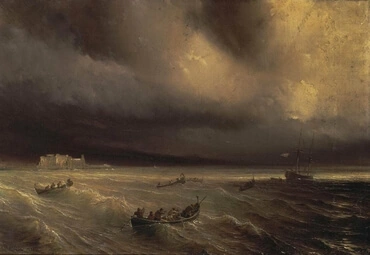1
Loquente Ephraim, horror invasit Israël ; et deliquit in Baal, et mortuus est.
7679. ‘Et Jehovah adduxit ventum orientalem’: quod significet destructionis medium, constat ex significatione ‘venti orientalis’ quod sit medium destructionis; quod ‘ventus orientalis’ id significet, est quia siccus erat et tempestuosus, et quia inde exsiccabat producta terrae illius, et per vim suam confregit arbores, et in mari naves; inde per illum ut per medium describitur potentiae Divinae effectus; praeterea per ‘orientem’ significatur bonum amoris et charitatis, quia in supremo sensu Dominus, n. 101, 1250, 3708; et bonum amoris ac charitatis in sua 1 origine, quia Divinum est, clementissimum, 2 inde etiam in suo processu in caelum; at cum delabitur ad inferna, fit inclemens ac immite, quia ab illis ibi vertitur in tale; ideo boni illius Divini influxus et praesentia ibi non modo cruciat illos, sed etiam devastat; 3 ex his etiam est quod per ‘ventum ab oriente’ seu ‘orientalem’ significetur medium destructionis.
[2] Quod per ‘ventum’ illum significetur medium destructionis, patet a locis ubi in Verbo memoratur, ut apud Jeremiam,
Sicut ventus orientalis dispergam illos coram hoste, 18:17:
apud Ezechielem,
Vitis plantata non prosperabitur; nonne cum attigerit illam ventus orientalis, exarescendo exarescet? 4 17:10:
apud eundem,
Vitis illa evulsa est in ira, in terram projecta, ventus orientalis arefecit fructum ejus, 19:12:
apud Hoscheam, Ille inter fratres ferox, veniet eurus, ventus Jehovae, a deserto ascendens, et exarescet scaturigo ejus, et exsiccabitur fons ejus, 13:15:
apud Davidem,
Per ventum orientalem confringes naves Tharschischi, Ps. 48:8 [KJV Ps. 48:7]:
apud Ezechielem,
In aquas multas deduxerunt te, contemnentes te, ventus orientalis fregit te in corde marium, 27:26;
ex his patet quod ‘ventus orientalis’ medium destructionis significet, ex causa quia siccus erat ac tempestuosus; inde quoque significat medium devastationis, ut apud Hoscheam, Ephraim pascens ventum, et persequitur 5 eurum, omni die mendacium et vastationem multiplicat, 12:2;
‘Ephraim’ pro intellectuali Ecclesiae, n. 5354, 6222, 6238; 6 ‘pascere ventum’ est multiplicare mendacium, et ‘persequi 7 eurum’ est multiplicare vastationem; status vastationis ac tentationis etiam vocatur ‘dies 8 euri’ apud Esaiam,
Poznámky pod čarou:
1. origine est Divinum ita
2. The following two (or in some cases more) words are transposed in the Manuscript.
3. inde quoque causa
4. The editors of the third Latin edition made a minor correction here. For details, see the end of the appropriate volume of that edition.
5. The editors of the third Latin edition made a minor correction here. For details, see the end of the appropriate volume of that edition.
6. The Manuscript inserts ubi.
7. The editors of the third Latin edition made a minor correction here. For details, see the end of the appropriate volume of that edition.
8. The editors of the third Latin edition made a minor correction here. For details, see the end of the appropriate volume of that edition.

In the Bible, the wind represents the power of the Lord working on us through the heavens. The Lord is love itself, and by extending His love He created the energy that created the universe, the energy that still sustains and empowers us. That love, and the wisdom that is its form, can act on us more or less directly depending on our spiritual states. A powerful wind indicates a more direct force.
It's interesting to note that the sun corresponds to the Lord, that its heat corresponds to the Lord's love and its light to the Lord's wisdom. In the natural world, the sun's heat causes wind by warming the air. In the spiritual world, the Lord's love causes spiritual wind by acting through heaven.
The Bible also talks about four winds, an east wind and a "wind of the sea." The four winds stand for the whole of the impact of the Lord's love. The east wind is withering, devastating – it represents the Lord's love as experienced by those in hell. The west wind represents stopping or turning aside the flow of the Lord's love – in Israel the "wind of the sea" would come from the west, opposing the east wind.
(Odkazy: Apocalypse Explained 418, 419; Apocalypse Revealed 343 [2-4]; Arcana Coelestia 7679, 7702)